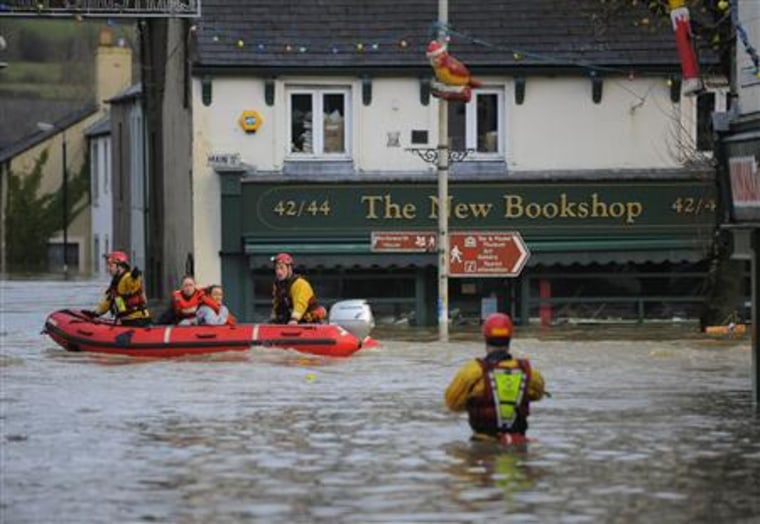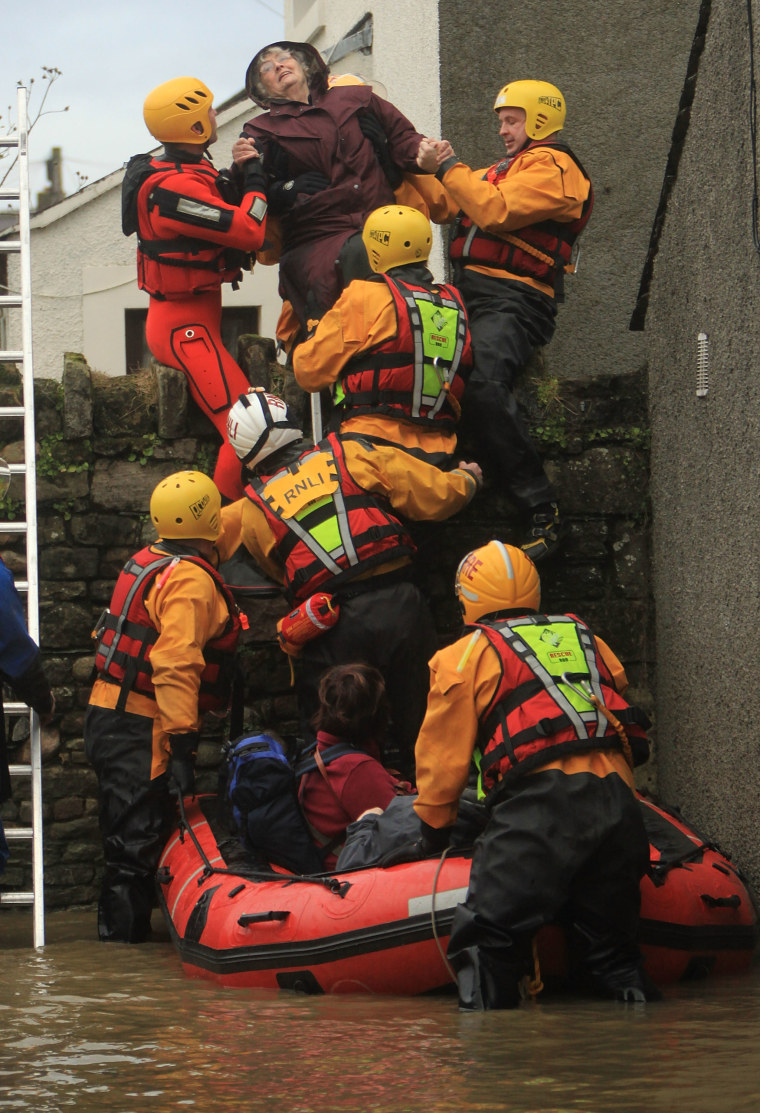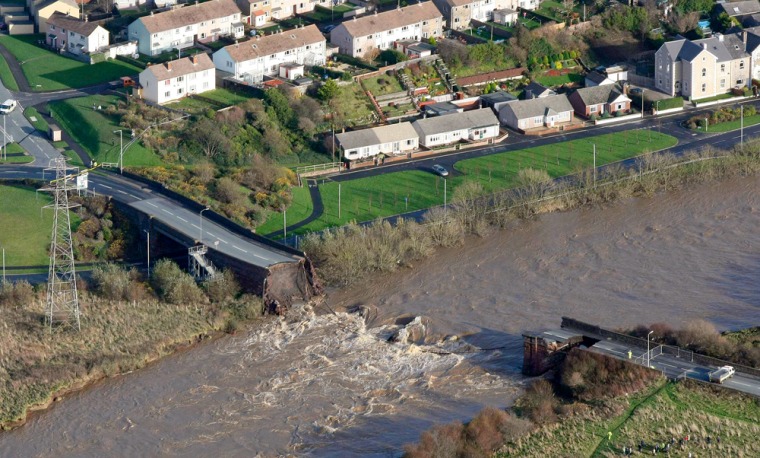Military helicopters winched dozens of people to safety and emergency workers in inflatable boats rescued scores more on Friday following the heaviest rainfall ever recorded in Britain. The flooding swamped northern England's picturesque Lake District, where a police officer died when a bridge he was on was swept away by surging waters.
British soldiers conducted house-to-house searches for those trapped by floods as deep as 8 feet. Troops also dropped down on lines from Air Force helicopters, breaking through rooftops to pluck people to safety.
Emergency services said more than 200 people were rescued in the hardest-hit town, Cockermouth and about 1,000 homes were flooded.
More heavy rain was forecast for Saturday. Officials issued four severe flood warnings — meaning extreme danger to life and property — in northwest England, and six in Scotland.
In a message to local officials, Queen Elizabeth II said she was "deeply concerned and saddened by the dreadful flooding across Britain." British Prime Minister Gordon Brown said Barker "was a very heroic, very brave man."
The heavy rain and gales also brought widespread flooding to Ireland, as more than 3 feet of water shut down the center of the country's second-largest city, Cork, and more than a dozen towns and villages.
Picturesque town 'devastated'
Cockermouth, a market town 330 miles northwest of London, lies at the junction of the Cocker and Derwent rivers and is known for being the birthplace of poet William Wordsworth.
"It has devastated the town," said Michael Dunn, manager of the Bitter End pub. "There is a lot of properties in Main Street, private shops, that have had their windows smashed in by the force of the water and by debris in the water. There were cars floating down the street. It will be a long time before Cockermouth recovers from this."
Officials were concerned about residents of 10 properties in Cockermouth they had been unable to reach. Media reports said some trapped people had been forced to smash through their roofs to escape.
The rain stopped and floodwaters began to ease Friday, giving rescuers a chance to reach trapped people by boat. Debris swirled around the boats as they pulled people to safety.
Tony Walker of Cockermouth told BBC radio he was on the top floor of his house and the water on the ground floor was chest-high.
"I've had better mornings," Walker said. "I've been here all night and I've run out of water now, so I'm thinking of making a break for it, really. The water is still pretty deep, it's going down, but at this rate it's going to be hours before it's clear."
Forecasters said the rainfall was unprecedented. Britain's Meteorological Office said a record 12.3 inches of rain fell in 24 hours in the area — the heaviest rainfall ever recorded in the U.K.
Local House of Commons lawmaker Tony Cunningham said the flood was "of biblical proportions," adding that "the scale and the force of the devastation in Cockermouth is huge."

Environment Secretary Hilary Benn told the BBC that flood defenses were meant to withstand a one-in-100-years flood — but could not cope with the volume of water.
"What we dealt with last night was probably more like one-in-a-1,000, so even the very best defenses, if you have such quantities of rain in such a short space of time, can be over-topped," Benn said.
Britain's Meteorological Office added that the amount of rain expected for all of November had fallen in one day.
Two bridges collapse
Police urged people not to travel, as many roads were impassible. Two bridges collapsed in the town of Workington, including a main one over the River Derwent.
Cumbria Police said Constable Bill Barker died after he was knocked into the water when the structure gave way.
Barker, 44, a father-of-four who was due to celebrate his birthday Saturday, had been directing motorists away from the bridge when it caved in.

"This is a stone bridge — to wash away a bridge of that size and dimension is incredible," said lawmaker Tony Cunningham.
Prime Minister Gordon Brown that he had spoken to Cumbria Chief Constable Craig Mackey to offer help.
"Our thoughts are with all those who have been impacted by these floods," Brown said.
Britain has been hit by severe flooding in recent years, raising questions about the impact of global warming.
Last year the country saw its wettest summer since records began in 1914. Floods in 2007 affected 55,000 homes and businesses and left an insurance bill of around $5 billion.
A spokesman for the Association of British Insurers said the latest floods appeared less destructive but it would take several days to make a reliable estimate.
In Ireland, the army deployed more than 100 soldiers, two dozen trucks and several flat-bottomed boats to evacuate people trapped by waist-deep floodwaters in cars and homes. A helicopter also winched to safety a County Galway family of five, including the 87-year-old grandmother.
The floods caused transport chaos along Ireland's western coast, with many major roads blocked and train services canceled.
The water caused extensive damage to the Lake Hotel on the shores of the fabled Killarney Lakes in County Kerry. About 170 guests at the Victorian period building had to be evacuated by tractor as dozens of staff carried period furniture upstairs.
The hotel's 12th-century castle, normally a floodlit tourist's highlight on the lake vista, was almost completely under water Friday.
"You can just see the top of the castle and everything else is covered," said the hotel's general manager, Niall Huggard.
The River Suck burst its banks in County Leitrim near the Northern Ireland border, flooding the town of Ballinasloe and cutting off major roads to Ireland's northwest. About 40 families had to be evacuated by boat.
The Irish weather forecasting service said parts of southern and western Ireland suffered their most intense and sustained rainfall in 30 years.
